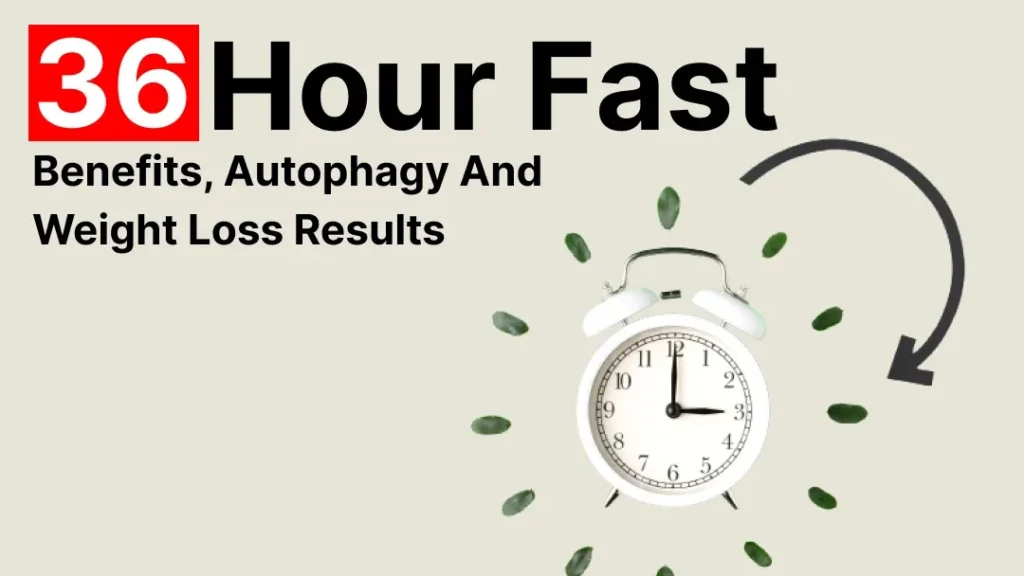This article will include information on how to train safely on fasting, the 36-hour fast benefits, and the science behind why this can be a great addition to your wellness regimen.
Fasting is a common practice in most cultures and religions worldwide, generally for spiritual or health-related purposes. Recently, the intermittent style of fasting has been one of the most powerful tools in achieving weight loss and general good health. Of the different types of fasting methods, a 36-hour fast is considered to have some beneficial advantages. In fasting circles, this is typically referred to as “extended intermittent fasting.” It’s usually an abstention from food for a full 36 hours—from dinner one evening, for instance, until breakfast two days later.
What is a 36-Hour Fast?
A 36-hour fast is actually one type of intermittent fasting in which meals are not consumed for 36 hours. This involves eating dinner at 7 PM, going without food the following day, and ending the fast and resuming eating at breakfast on the third day. For some 36-hour fasts, water, herbal teas, and black coffee are normally allowed to stay hydrated and help suppress hunger.
The Science of Fasting
This process includes the activation of a variety of metabolic processes in the body. At the beginning of the fast—most specifically, during the first few hours—your body looks up to the glucose stored in your liver as the most readily available source of energy. As the fast progresses and the stores of glucose start depleting, the body enters a metabolic state, in other words, ketosis, when all the stores of fat are broken down into ketones to provide energy. This can range from mere weight loss to an improved mechanism for cellular repair.

Top 10 points towards 36-Hour Fast Benefits:
1. Enhanced Weight Loss and Fat Burning
May promote weight loss: Perhaps the most notable benefit of fasting for this length of time is the potential for weight loss. Being a more extended period of fasting compared to the classic 16- or 24-hour fast, this way, it means your system can spend more time just using up those glycogen stores and then dive into the fat for the major source of energy. It could amount to more fat loss and work particularly well for those who have plateaued using shorter fasting periods.
2. Improved Insulin Sensitivity
This has been proven to increase insulin sensitivity, which is a very critical determinant of blood sugar levels and a risk factor involved in type 2 diabetes. When you fast, the body is given time to renovate its response to insulin. Hence, there will be reduced levels of insulin and enhanced sensitivity. This simply means your body will be better at using insulin to control sugar in the blood, thus protecting the body from insulin-resistant menace and metabolic disorders.
3. Autophagy and Cellular Repair
Autophagy is that system through which damaged cells are cleaned out by the body in the regeneration of new cells. This cellular housekeeping is significantly essential in the maintaining of vital, healthy tissues within organs.
Fasting, majorly 24 hours and above, boosts the autophagy process significantly, thus removing dysfunctional proteins, decreasing inflammation, and thereby acting against a wide variety of diseases, including neurodegenerative disorders like Alzheimer’s and Parkinson’s.
4. Improved Mental Clarity and Cognitive Function
Many people report that their clarity of thought and their focus are significantly increased over prolonged fasting times. Part of this may be because of the increase in ketones, which offer the brain a great fuel source. Another mechanism is that fasting induces a process known as brain-derived neurotrophic factor (BDNF), which plays a key role in supporting brain health and cognition.
5. Better Metabolic Health
A 36-hour fast can significantly affect the change in one’s metabolism. Since fasting gives your gut a longer time off, this reset your metabolic rate, works on bettering the balance of your hormones, and decrease oxidative stress. This may result in improved lipid profiles, lower blood pressure, and a reduced chance of cardiovascular disease.
6. Better Digestion and Gut Health
It will, in turn, take the digestive system a rest in order to repair itself, thus promoting a healthier gut. It will balance the gut microbiome, reduce inflammation in the gut lining, and maybe reduce symptoms of such digestive disorders as irritable bowel syndrome. The assimilation of more nutrients into the body will also result from a healthier gut as well as making the immune system stronger altogether.
7. Promotes Longevity
Research confirms that this—intermittent fasting, including such long fasts as the 36-hour fast—has anti-ageing benefits and promotes longevity. These processes are set into work after fasting, leading to autophagy, and reducing oxidative stress—both of these mechanisms have been linked with slower ageing processes and a diminished risk for age-associated diseases.
8. Lower Chances of Inflammation
Indeed, chronic inflammation underlies many diseases, from cardiovascular diseases to cancer and a range of autoimmune disorders. Fasting has been shown to lower markers for such inflammation. This anti-inflammatory effect may be due to the lessening of oxidative stress and also to the fact that the body gets more time to do its self-repairs in the absence of food intake.
9. Effects on sleep quality:
Extended fasting can also aid in improving sleep. Since the body is not consistently working up digesting food, it can concentrate on rest and repair during the sleeping periods. It’s common to enjoy deeper and more restorative sleep after fasting, which helps to make one experience better all-around health and well-being.
10. Enhanced sense of discipline and mental rigidity
There is a mental part of the 36-hour fast, as it is physically challenging. If you are going to get a fast longer than this in your lifetime, it will help you be mentally stronger than you ever thought possible. For the most part, this mental toughness can be translated to all areas of the participant’s life to eventually help in hitting set goals and making healthier choices.
How to Safely Do a 36-Hour Fast
As much as the benefits of a 36-hour fast are compelling, one needs to go about it in such a way that it’s applied safely, with full attention to your body, especially if you are new to fasting. Here are some of the tips for ensuring a safe and effective fasting experience:
1. Gradually Ease into It
If it is your first time fasting, take it easy; progress to 36 hours of fasting gradually. You can begin with 12-hour or 16-hour fasts—increment fasting time when the physical body becomes more accustomed to fasting.
2. Stay Hydrated
Keeping hydrated during a 36-hour fast is very important. Drink lots of water, and you can also include herbal teas and black coffee. Hydration steers one clear of headaches, dizziness, and other symptoms of dehydration.
3. Listen to Your Body
Fasting can be really rough if you are not accustomed to it. Watch the response from your body towards the fast. If you are feeling uncontrollable pain, dizziness, or other alarming symptoms, you may need to break the fast and take some healthy food.
4. Breaking the Fast Gradually
After fasting for 36 hours, it’s important to break your fast gently. Try for a light, balanced meal with easily digestible foods like fruits and vegetables—lean proteins can be included. Avoid heavy, greasy, or processed foods that are going to be hard to digest after a long fast.
5. Consult Health Professionals
It is better to interact with a healthcare professional before attempting a 36-hour fast in case you have any other chronic illness or are under medication. In the case of diabetics or people showing symptoms of heart ailments, or even being pregnant or lactating, this is basic advice.
6. Who Should Not Do a 36-Hour Fast?
While fasts are very useful for most of us, there are certain instances when it is not ideal. Those who have medical conditions, are thin or have a history of eating disorders, and people with any other serious illness should not go for long fasting. Furthermore, pregnant and lactating women must avoid 36-hour fasts unless strictly monitored by the doctor.

Challenges And Tips:
Fasting for the last 36 hours seems a pointless and very physically draining task, even mentally. Some common challenges and tips on 36-hours fast for getting over them are:
1. Hunger Pangs
The most common challenge that almost everyone experiences during a fast is dealing with hunger sensations. One can get busy with activities that divert one’s mind from continuous thoughts about food and remain busy. Make sure water is taken in or herbal tea or black coffee is consumed to suppress the appetite.
2. Low Energy Levels
Some people have low energy during a long fast, especially if this is your first time. Rest if you need to, and try not to overexert yourself. As your body adjusts to fasting, you may discover that your energy levels stabilise.
3. Social Difficulties
Fasting may become quite a social challenge, especially if you have family feasts and other social communication planned. Planning your fast around these events or explaining to friends and family members about your fasting regime would help mitigate awkwardness.
Extended fasting is an exercise of mental toughness and discipline. Having clear intentions and reminding yourself of the benefits is a leading solution when it comes to motivation. Meditation, deep breathing exercises, and journaling can be helpful tools in managing the mental difficulties you may encounter during your fast.

Conclusion
Depending on how it best serves you and your lifestyle, you might decide you will incorporate 36-hour fasts periodically. Others might do a 36-hour fast each week, while some will do it every month and, for some, only occasionally. The key is that you need to tune in to your body and find a frequency that really works for you.
This 36-hour fast is an amazing tool for losing weight, gaining metabolic health, improving mental clarity, and supporting longevity. It is not one-size-fits-all. Benefits from fasting depend on individual health conditions, goals, and lifestyle.
As long as you are just about to start incorporating a 36-hour fast into your wellness routine, be sure to do this mindfully and with proper preparation. Start slowly, stay hydrated, and listen to your body throughout the process. For people who are able to do this and fast safely for the stated period, a 36-hour fast provides health benefits that extend far beyond the period of fasting itself and contribute toward a lifetime of good health.
Always consult with a health professional before you start fasting, especially if you have had any previous health conditions.
